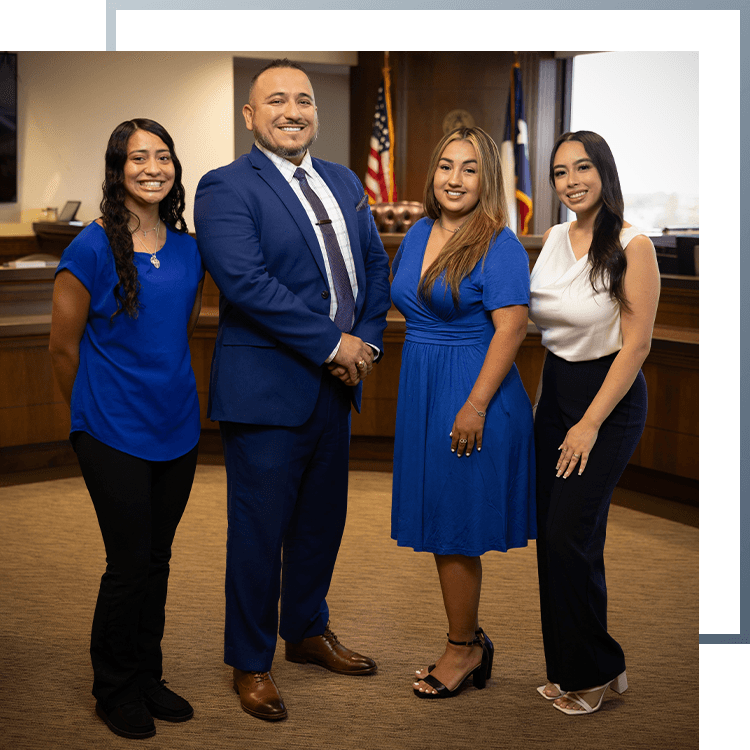
DWI Lawyer in Midland
A DWI Arrest Can Turn Your Life Upside Down. Don’t Face it Alone
Facing a DWI charge in Midland can be daunting. Texas has stringent drunk driving laws, and understanding the intricacies of your case is vital for your defense. A DWI occurs when a driver operates a vehicle with a blood alcohol concentration (BAC) of 0.08% or higher. Being charged can result in severe penalties, including fines, license suspension, and even jail time.
Additionally, the consequences of a DWI can affect many aspects of your life, from employment opportunities to personal relationships. It's crucial to understand that a DWI conviction stays on your record, impacting your future. Therefore, seeking legal advice promptly after being charged is key to mounting an effective defense.
Call a skilled DWI lawyer in Midland at (432) 224-8036 or contact us online to schedule your free legal consultation and start fighting for your future.
Understanding DWI Charges in Texas
In Texas, Driving While Intoxicated (DWI) is defined under Texas Penal Code Section 49.01(2). This definition of "intoxicated" is crucial and encompasses impairment from alcohol, drugs, or a combination of both.
To secure a DWI conviction, the prosecution must prove beyond a reasonable doubt that:
- You were operating a motor vehicle
- In a public place
- While intoxicated. This can be proven by:
- "Per Se" Intoxication – Having a Blood Alcohol Concentration (BAC) of 0.08% or greater. This is typically proven by a breath or blood test. For a Midland DWI lawyer, challenging the accuracy of these tests is often a key strategy.
- Loss of Normal Faculties – Even if your BAC is below 0.08%, you can still be convicted if the prosecution can prove that your physical or mental faculties were impaired to an appreciable degree by alcohol, drugs, or a combination of substances, making you unable to drive safely. This often relies on subjective observations by the arresting officer and performance on Field Sobriety Tests.

Cases We Handle
Our Firm Stands With You
Penalties for DWI Convictions in Texas
Texas imposes exceptionally harsh and escalating penalties for DWI convictions, particularly for repeat offenses or when aggravating factors are present.
First Offense DWI (Misdemeanor):
- Class B Misdemeanor:
- Jail Time: 3 to 180 days in county jail.
- Fine: Up to $2,000.
- Driver's License Suspension: 90 days to 1 year.
- Annual Surcharges (State Fine): $1,000 to $2,000 for three years following conviction.
- Class A Misdemeanor (if BAC is 0.15% or more, or if there's an open container):
- Jail Time: Up to 1 year in county jail (minimum of 72 hours).
- Fine: Up to $4,000.
- Driver's License Suspension: 90 days to 1 year.
- Annual Surcharges (State Fine): $1,000 to $2,000 for three years.
- Ignition Interlock Device (IID): A judge may order the installation of an IID on your vehicle as a condition of bond or probation.
Second Offense DWI (Misdemeanor):
- Class A Misdemeanor:
- Jail Time: 30 days to 1 year in county jail.
- Fine: Up to $4,000.
- Driver's License Suspension: 180 days to 2 years.
- Annual Surcharges (State Fine): $1,500 to $2,000 for three years.
- Mandatory IID: Often required for at least one year.
Third or Subsequent Offense DWI (Felony):
- Third-Degree Felony:
- Prison Time: 2 to 10 years in Texas state prison.
- Fine: Up to $10,000.
- Driver's License Suspension: 180 days to 2 years.
- Annual Surcharges (State Fine): $2,000 for three years.
- Mandatory IID: Often required for at least one year.
Aggravating Factors That Increase Penalties (often leading to felony charges):
- DWI with Child Passenger (Texas Penal Code 49.045): If you are arrested for DWI while transporting a child younger than 15 years of age. This is a State Jail Felony (180 days to 2 years in state jail; up to $10,000 fine). This is one of the most common ways a first-time DWI can become a felony.
- Intoxication Assault (Texas Penal Code 49.07): If your impaired driving causes serious bodily injury to another person. This is a Third-Degree Felony (2 to 10 years in prison; up to $10,000 fine).
- Intoxication Manslaughter (Texas Penal Code 49.08): If your impaired driving causes the death of another person. This is a Second-Degree Felony (2 to 20 years in prison; up to $10,000 fine).
- Refusal to Submit to a Chemical Test: While not a criminal penalty itself, refusing a breath or blood test leads to an automatic driver's license suspension (ALR) of 180 days for a first refusal, and up to 2 years for subsequent refusals. This refusal can also be used as evidence against you in court.
- Prior Convictions: Prior DWI convictions (even outside the 10-year look-back period for criminal enhancement) can influence a judge's sentencing decision and eligibility for programs like deferred adjudication.

Real Stories From Real People
Our Firm Stands With You
-
"I can’t thank him enough!"
He made my experience dealing with my legal affairs incredibly easy and the value he provided my family was incredible through a tough time.- Noe G. -
"A true professional in his field."
I higly recommend Mr. Sarabia for counsel. He is very communicative and kept my expectations realistic. I had a great experience and outcome.- Lia I. -
"He did a wonderful job advocating for me."
Hands down the best attorney. Not only did he believe in me and my criminal case as if I was his own family, he consistently communicated with me throughout the entire ordeal.- Megan M. -
"Thank you guys for your amazing services."
I hired Sarabia law firm and I'm extremely happy and completely satisfied with their services, they were able to get my case dismissed and kept in touch with me the entire time. Thank you guys for your amazing services.- Yesenia O.

Frequently Asked Questions
Can I Refuse a Breathalyzer Test in Midland?
Yes, but refusal comes with automatic penalties under Texas’s implied consent law. A first refusal results in a 180-day license suspension; subsequent refusals may lead to a suspension of up to 2 years. Refusing may prevent immediate test results from being used against you, but it can complicate your case.
Our attorneys help weigh the pros and cons of refusal and use the circumstances to your advantage during defense planning.
How Does a DWI Affect My Driver’s License?
Following a DWI arrest, you may face an Administrative License Revocation (ALR), which is separate from criminal court proceedings. You must request a hearing within 15 days of your arrest to challenge the suspension.
Sarabia Law Firm provides representation for both criminal and ALR proceedings, working to protect your ability to drive and limit long-term consequences.
Do I Need to Attend All Court Appearances?
Yes. Failing to appear in court can result in a bench warrant or additional charges. We help you stay on top of every date, and in some cases, we may appear on your behalf if permitted by the court. Our team ensures you're prepared and informed ahead of each step to reduce disruption to your daily life.
What Should I Bring to My Initial Consultation?
Bring any paperwork related to your arrest, including the ticket, court notices, bond information, and your personal account of the event. Supporting items like photos, videos, or witness details are also useful.
At Sarabia Law Firm, we offer free consultations to review your case and outline your legal options in detail. Call us at (432) 224-8036 to get started.
How Long Will a DWI Stay on My Record in Texas?
A DWI conviction in Texas stays on your criminal record permanently unless it’s dismissed or sealed through a non-disclosure order—an option in limited cases. Even first-time offenses can have lasting effects on employment, housing, and insurance. We explore all legal avenues to prevent or limit long-term damage.
Can I Still Drive After a DWI Arrest?
Yes, but only temporarily unless you take action. After your arrest, you typically have 15 days to request an ALR hearing. If granted, you may be eligible for an occupational driver’s license, allowing limited driving for work, school, or essential household duties. We can guide you through the application process to keep you on the road legally.
Can I Avoid Jail Time for a First DWI Offense?
In some cases, yes. Depending on the circumstances, alternative sentencing like probation, community service, DWI education programs, or alcohol monitoring may be available. We work to negotiate outcomes that preserve your freedom and help you move forward with minimal disruption to your life.